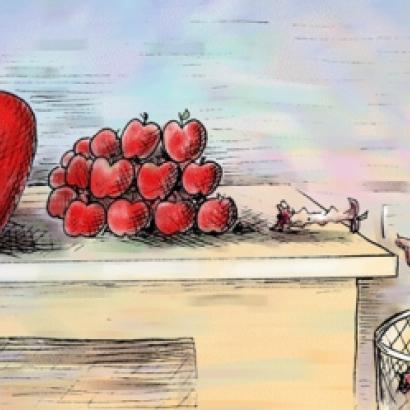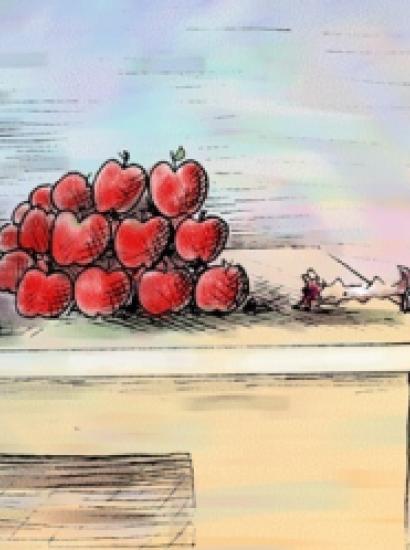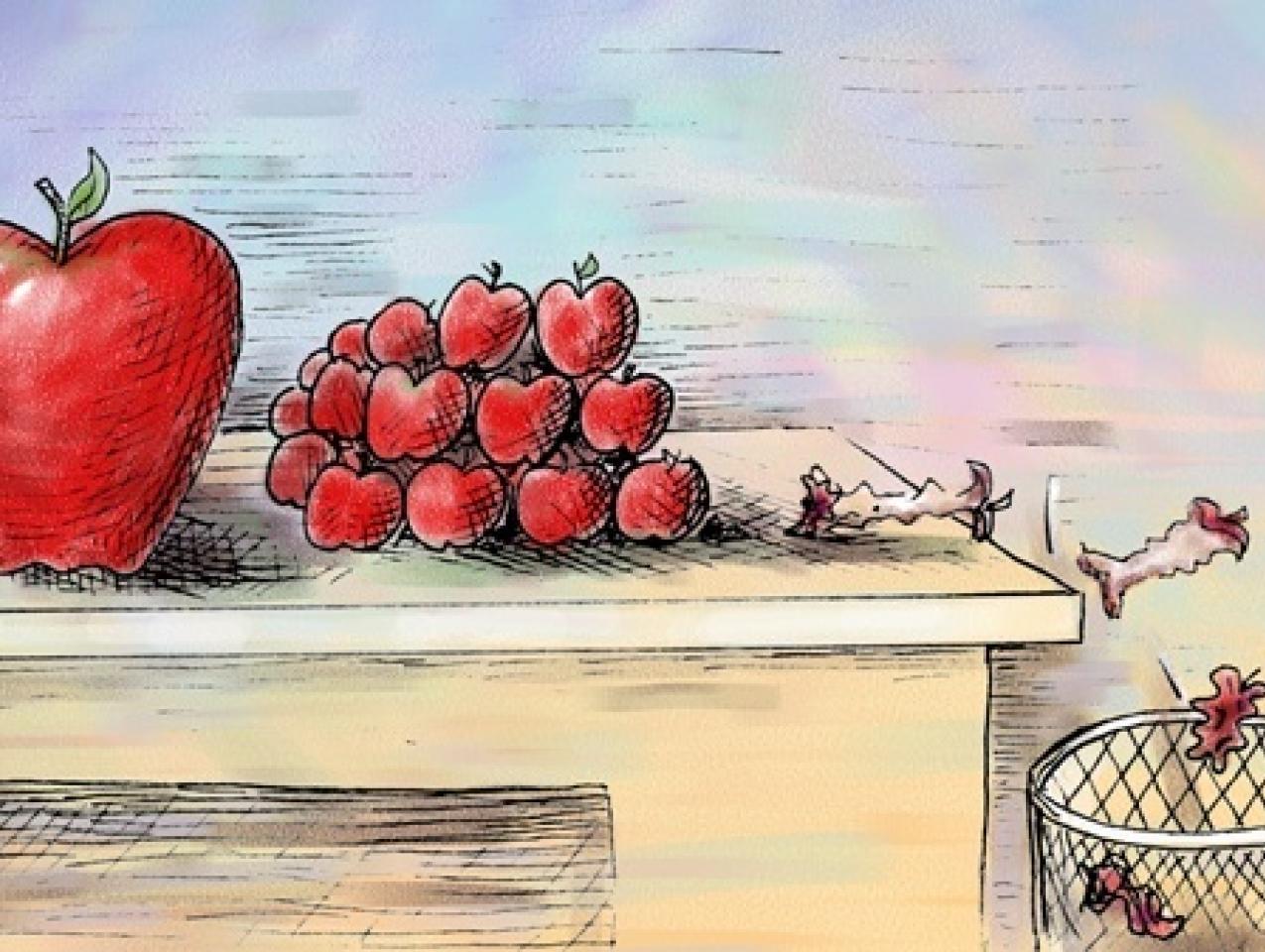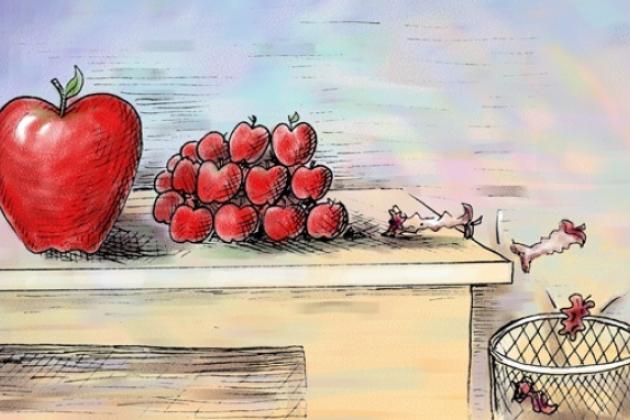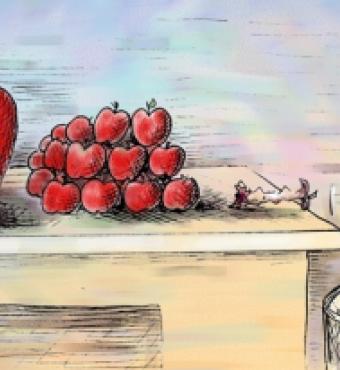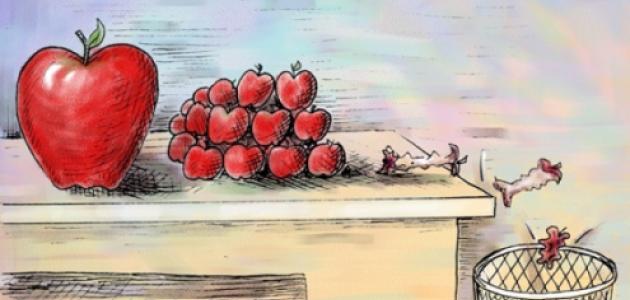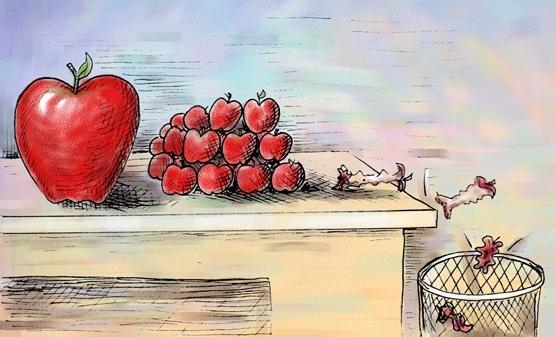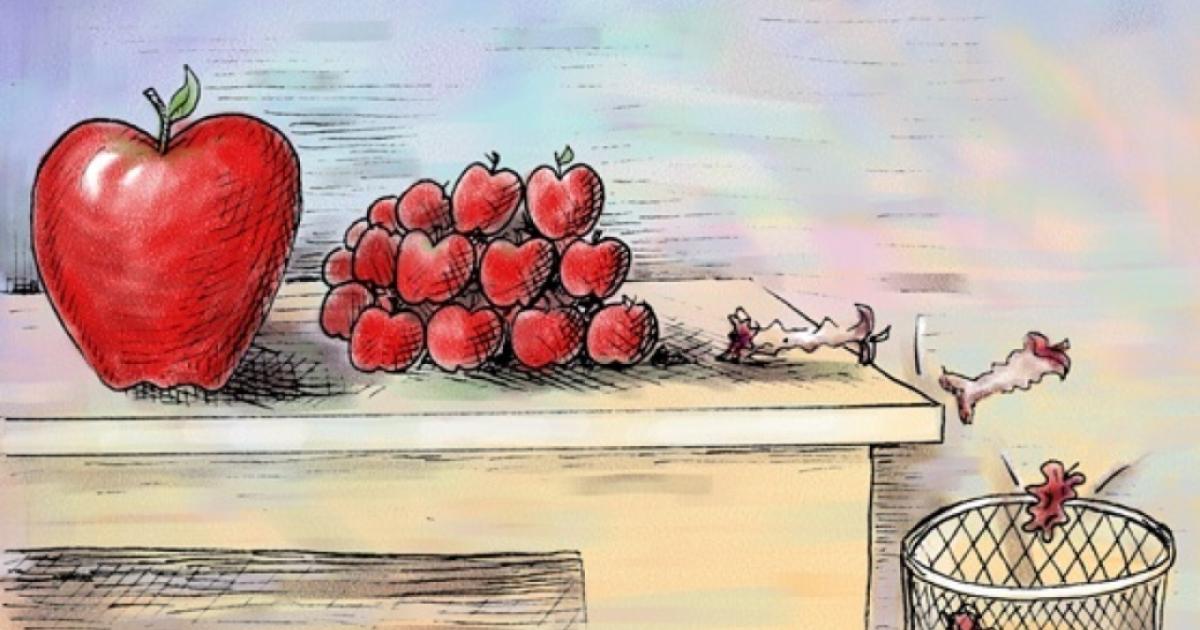- Education
- K-12
This essay has been adapted from a Wall Street Journal op-ed by the author.
In the last four decades, student-teacher ratios and class sizes have fallen dramatically. A majority of teachers now have master’s degrees. Spending per student has quadrupled, after allowing for inflation. Teacher experience is at postwar highs, and few teachers lack formal certification.
Despite all this, student performance today is roughly the same as it was in 1970. This is in large part thanks to the inability to improve the quality of our teachers.
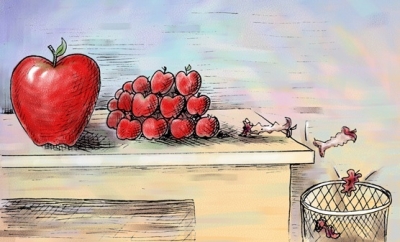
Illustration by Barbara Kelley
What does the research say?
The research consistently demonstrates that there are very important differences among teachers. While this finding does not surprise most parents or students, who are well aware that some teachers are simply much more skilled and effective than others, it has actually taken some time to confirm it with research. Additionally, a finding that is particularly important for policy deliberations is that the differences in teacher skills are not captured by the most commonly used measurements—teacher qualifications, degrees, years of experience, and the like.
If we can’t identify the best teachers by comparing their credentials, we face an obvious and crucial question: How do we define a good teacher?
The best way—indeed the only objective way currently available—to identify a teacher’s effectiveness is to observe her classroom performance and specifically what her students learn.
From this new perspective, a good teacher is one who consistently evokes large gains in student learning, while a poor teacher is one who consistently gets small gains in student learning.
The magnitude of the differences in effectiveness among teachers is impressive. For example, looking at the range of quality for teachers within a single large urban district, teachers near the top of the quality distribution elicited an entire year’s worth of additional learning out of their students (during a single academic year) compared to those near the bottom.
Beyond that, looking at just the variations in performance from differences in teacher quality within a typical school, the statistical analyses indicate that moving from an average quality teacher to one ranked among the top 15 percent of all teachers can be expected to move the average student up more than 8 percentile rankings during the course of a school year. In other words, an average student who got one of these good teachers would move from the middle of the achievement distribution (the 50th percentile) to the 58th percentile.
Such improvements are truly substantial. Extrapolate them over several years in a high-ranked teacher’s classroom, as compared to an average teacher’s, and you can see that the cumulative student improvement can be huge. And of course the difference in student achievement is likely to be much greater when a high-ranked teacher is compared to a below-average teacher.
With these differences in mind, consider the popular argument that family background is an overwhelmingly important factor in student achievement and that schools cannot be expected to make up for bad preparation at home. This argument has led to a counsel of despair: with a school full of poor children, many of whom suffer from broken homes, neglectful parents, and deficits in nutrition and health care, schools can do little to nothing, the argument goes.
If we could replace the bottom 5 to 10 percent of teachers with an average teacher—not a superstar—we could dramatically improve student achievement.
There is no doubt that the family is very important in influencing a student’s preparation for learning. But family is not destiny. The previous estimates of teacher performance suggest that having three to four years of good teachers in a row would generally overcome the average achievement deficit between low-income kids (those on free or reduced-price lunch) and others. In other words, high-quality teachers can make up for the typical deficits that we see in the preparation of kids from disadvantaged backgrounds.
Unfortunately, the current school system does not ensure a three- or four-year run of high-quality teachers. In fact, it is currently just as likely that the typical student will get a run of bad teachers, with equally large achievement losses.
What does this mean for policy?
This research has not, however, entered directly into many policy discussions—in part because teacher unions generally oppose the idea of assessing differences in effectiveness of teachers. They would much rather focus on the training and preparation of teachers—resisting the idea that one should instead focus on teacher effectiveness in the classroom.
The range of options the unions push include raising the coursework requirement for teacher certification, testing teachers on either general or specific knowledge, requiring specific kinds of undergraduate degrees, and requiring master’s degrees. Little evidence suggests that any of these are strongly related to teacher quality and to student achievement.
The alternative view is that the problem is not requirements that are too loose but an inappropriate structure of incentives in educational systems. With the current organization of schools, nobody’s job or career is heavily dependent on student performance.
This is not to say that teachers’ administrators are currently misbehaving or ignoring the needs of students. Most teachers are very hardworking and try to do the best they can in the classroom. But like all human beings, teachers respond to the incentives that are placed in front of them—and the current incentive systems used in public education do not make higher student achievement the chief objective.
It seems like an obvious solution is to focus performance incentives for teachers and other school personnel on student achievement. Reward those who do well, and don’t reward those who do poorly.
Why hasn’t it happened?
One reason for the general resistance by teachers and their unions to incentive systems such as performance pay is concern about what will be rewarded.
As discussed, we know that families can make a huge difference in the education of students. One implication is that we should not reward or punish teachers for the portion of educational outcomes they are not responsible for. If some students come to school better prepared than others, their teachers should not receive extra rewards for the good results that background produces. Similarly, if students come from disadvantaged backgrounds that leave them less well prepared for schools, we should not punish their teachers.
This requires an aggressive system of performance measurement that can separate the effects of classroom performance by the teacher from the influence of external factors that the teacher can’t control. We have to be able to track the progress of individual students and relate this progress to the teachers who are responsible for it. But such accountability has become a contentious issue, especially when it is taken down to the level of individual teachers.
In simplest terms, the teacher unions do not want to make distinctions among teachers, so they resist any efforts to base judgments on how individual teachers affect student performance.
The forces for reform have coalesced into a common front, and one that pits the teacher unions against any reform of teacher policies. In Washington, the Obama administration's Race to the Top program rewarded states for making significant policy changes such as supporting teacher performance pay and charter schools. In Los Angeles, the "Los Angeles Times" published the effectiveness rankings for 6,000 fully identified teachers, and this idea is spreading to New York City and other places. Nationwide, the documentary Waiting for "Superman" which focused on both teacher quality and charter schools, was a success at the box office.
One might think that teacher unions would like research suggesting that high quality teachers were critically important. But the union’s first response to the "Los Angeles Times", to the New York City threat, and to Waiting for "Superman" has been that these entities are waging a "war against teachers."
According to the American Federation of Teachers, "The film's (i.e., Superman’s] central themes—that all public school teachers are bad, that all charter schools are good and that teachers' unions are to blame for failing schools—are incomplete and inaccurate, and they do a disservice to the millions of good teachers in our schools who work their hearts out every day."
Teachers respond to incentives. But the current incentive systems used in public education do not make student achievement the chief objective.
But that is not going on at all. President Obama states that we can't tolerate bad teachers in classrooms, and he has promoted rewarding the most effective teachers so they stay in the classroom. The "Los Angeles Times" published data identifying both effective and ineffective teachers. And Waiting for "Superman" (in which I provide commentary) highlighted exceptional teachers and pointed out that teacher unions don't focus enough on teacher quality.
This is not a war on teachers. It is merely a recognition that some teachers are exceptional, but a small number are dreadful. And if that is the case, we should think of ways to increase the proportion of good teachers.
My research—which has focused precisely on teacher quality as measured by what students learn with different teachers—indicates that a small proportion of teachers at the bottom is dragging down our schools. The typical teacher is both hardworking and effective. But if we could replace the bottom 5 to 10 percent of teachers with an average teacher—not a superstar—we could dramatically improve student achievement. The U.S. could move from below average in international comparisons to near the top.
If unions continue not to represent the vast numbers of highly effective teachers, but instead to lump them in with the ineffective teachers, they will continue doing a disservice to students, to most of their own members, and to the nation.
There is a place for an enlightened union that accepts the simple premise that teacher performance is an integral part of effecting reform. As the late Albert Shanker said in 1985, when he was president of the American Federation of Teachers: "Teachers must be viewed as professionals, as experts whose judgment can be counted on, as a group that acts on behalf of its clients and takes responsibility for the quality and performance of its own ranks."
The ultimate goal of the incentive systems we design must be to attract, encourage, and reward high-performing teachers while pushing low-performing teachers toward either improving their efforts (if they are capable of doing so) or leaving the profession altogether. Over time, the effect of such systems will be to greatly increase the number of good teachers while drastically reducing the number of ineffective teachers. In a school system that reforms along these lines, the chance that a student can enjoy several successive years with an excellent teacher will be much higher. Reduced achievement gaps and heightened overall levels of accomplishment should be the result.
There is strong public support for reform in our schools, and it is time to mobilize that support to restore the strength of our schools. In that, the focus must be ensuring a highly effective teacher in every classroom.








